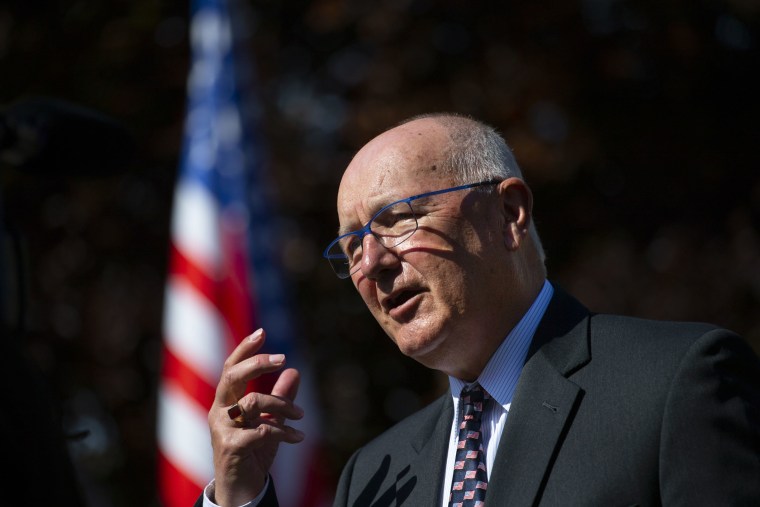The Republican National Committee formally stepped in Wednesday to resolve more than a month of conflict over who really leads the Michigan GOP. Now, the state Republican Party needs to turn around and put on a party-run caucus in early March.
Michigan’s presidential primary is on Feb. 27, after the Democratic National Committee agreed to a new schedule of nominating contests that moved the state earlier. But that wasn’t compliant with RNC rules, resulting in a two-part solution: Republican voters in Michigan will now be able to participate in the state’s primary on Feb. 27, followed by the GOP caucus on March 2, where party insiders will decide most of the state’s presidential delegates that will be at the national convention in Milwaukee this summer.
While the state runs the primary, the party puts on the caucus — and the party is having trouble running anything right now. In January, a group of Michigan GOP state committee members voted to remove Kristina Karamo, who has served as state party chair since February 2023, but she said the vote was illegitimate and has refused to give up her position to former Rep. Pete Hoekstra, who was voted in by a separate faction last month.
On Wednesday, the Republican National Committee formally recognized Hoekstra as the chairman, though Karamo implied she’ll continue fighting. Amid the civil war with Hoekstra, who won support from former President Donald Trump, she had retained control of party email accounts and other assets.
Karamo released a defiant statement Wednesday night via video message on the Michigan GOP’s X account, which she still controls. She intends to continue acting as the leader of the state party, despite the recognition of Hoekstra as its new leader — raising questions about whether rank-and-file Republicans will be getting mixed messages about the March 2 caucuses and who is running them.
“This is egregious. The RNC feels they have the authority to override the will of the state central committee and the delegates,” Karamo said. “But as you began to pull back the curtain more and more, you begin to see that there was a deeply well-funded effort to sabotage this movement.”
Neither Karamo nor Hoekstra expressed concerns in interviews earlier this month that the leadership tussle might add to confusion and messaging challenges surrounding the state’s new two-part nominating process or hurt their ability to execute the contests.
Hoekstra acknowledged that the process might be “a little messy” but said he’s doing everything he can to help it run as smoothly as possible.
“We’re gonna have more aggressive messaging at this point, you know — it’s just been email communication, social media posting,” Karamo said in her interview with NBC News. “But now, with it being less than 30 days away, we’re going to heavily intensify the messaging to make sure that voters are aware of it. It is something very new, and it may be confusing to people, so we want to make sure we overcommunicate.”
Hoekstra said that while there may be lower turnout in this year’s election, the primary cause would be the lack of candidate competition rather than confusion over where and how to vote.
“What you’re seeing is there’s going to be lower turnout. It is a confusing process, OK?” Hoekstra said, adding: “There’s no doubt with that. But the lower turnout is going to be [because] there’s nobody campaigning.”
Former Michigan GOP Chair Saul Anuzis said the splintering of the state party could have an impact on the process of choosing delegates, but he doesn’t foresee it being an issue in an election cycle in which Trump appears to hold a commanding lead.
“Theoretically, each of the parties could choose a different set of delegates under different rules and different perspectives, and then go to the convention, and have the contest committee decide which delegation gets seated,” Anuzis said in an interview before the RNC proclaimed Hoekstra the state party chair.
“It’s a pain, and it makes it more difficult for the campaigns,” Anuzis added. “But my guess is, by the time Michigan comes around, Trump will be the presumptive nominee, which he almost is now.”
And looking forward to November, the former state party chair said he didn’t anticipate the leadership tussle — and the party’s funding troubles under Karamo in 2023 — would have too much effect on the results of the presidential race in the state. But any effect is unwelcome when presidential races have been so close in recent years.
“It’s an inconvenience. It would be better to have a strong functioning party,” Anuzis said, calling Michigan “a purple state that goes red under the right circumstances.”
“The Democrats normally have a competitive advantage walking in. But when we do well, when we got good candidates and everybody’s clicking on all cylinders, we got a better shot at winning, so it hurts us,” Anuzis concluded.

